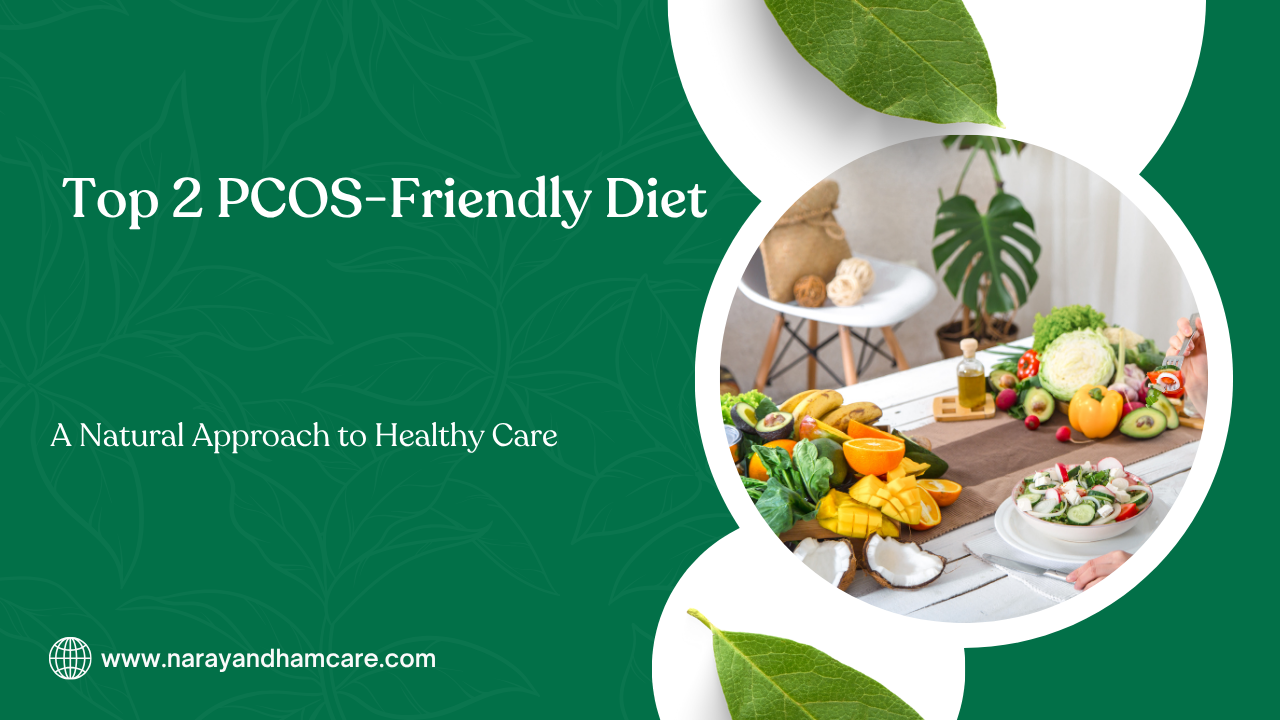🔹 Introduction of PCOS
Polycystic Ovary Syndrome is a common health condition affecting millions of women around the world. It is a hormonal disorder that can cause problems like irregular periods, acne, weight gain, mood swings, hair loss, and even infertility.
The good news is — your diet can help balance your hormones naturally. Eating the right foods can improve symptoms and support your long-term health.
In this blog, you will learn the top 3 PCOS-friendly diet tips that are easy to follow and powerful for hormonal balance. These diet tips are simple, natural, and beginner-friendly.
Whether you are newly diagnosed or have been struggling with PCOS for years, this guide will help you take control of your health, skin, hair, and mood.
🔹 Problem: What Happens in PCOS?
it is caused by an imbalance in hormones — especially insulin and androgens (male hormones). In women:
- The body becomes resistant to insulin
- The ovaries produce too many male hormones
- This affects periods, ovulation, weight, and skin
it affects girls and women between the ages of 15 and 40. Many do not even know they have it until they start facing health problems.
Main challenges PCOS causes:
- Irregular or missed periods
- Difficulty in getting pregnant
- Unwanted hair growth (face, chest, back)
- Acne and oily skin
- Hair thinning or hair loss
- Weight gain or trouble losing weight
- Mood changes and anxiety
PCOS is not a disease — it is a lifestyle-related condition. With the right diet and lifestyle, it can be managed naturally.
🔹 Symptoms
Here are some common symptoms that you should not ignore:
- Periods are irregular, delayed, or skipped
- You gain weight easily and find it hard to lose
- Acne or pimples on face, back, or chest
- Hair fall or hair thinning from the scalp
- Dark patches of skin on neck or underarms
- Unwanted facial hair (chin, upper lip)
- Mood swings, low energy, or feeling anxious
- Difficulty getting pregnant
Not all women have all symptoms. But even 2–3 of these signs may indicate a hormone imbalance caused by PCOS.
🔹 Solution: Top 2 PCOS-Friendly Diet Tips for Hormonal Balance
Let’s now look at 2 easy diet tips that support hormone health and reduce PCOS symptoms naturally.
Tip 1: Eat a Low Glycemic Index (Low-GI) Diet
What is GI (Glycemic Index)?
It tells us how fast a food raises blood sugar. High-GI foods (like sugar, white bread) spike blood sugar quickly. This leads to more insulin, which worsens .
Women with often have insulin resistance — the body does not use insulin properly. This causes weight gain, irregular periods, and high androgens.
A low-GI diet helps by:
- Keeping blood sugar and insulin balanced
- Reducing male hormones
- Supporting regular periods
- Helping with weight control
Best Low-GI Foods to Eat:
- Whole grains: brown rice, oats, barley, quinoa
- Legumes: moong dal, chickpeas, kidney beans
- Green vegetables: spinach, methi, kale, broccoli
- Fruits: apple, guava, orange, pear, berries
- Sweet potato
- Flaxseeds and chia seeds
- Nuts and seeds (almonds, walnuts, pumpkin seeds)
Avoid High-GI Foods:
- Sugar and sugary drinks
- White rice, white bread, pasta
- Processed snacks (chips, biscuits, namkeen)
- Cakes, pastries, ice cream
- Fruit juice and packaged foods
PCOS Diet Tip: Always add fiber and protein to your meals. This slows down sugar release and keeps you full longer.
Example: Instead of eating plain rice, have brown rice with dal and veggies.
Tip 2: Add Healthy Fats and Plant-Based Protein
it causes inflammation in the body. Healthy fats and protein can reduce this inflammation and help in hormone production.
Fat is not always bad. Your body needs good fats to make hormones. Also, protein helps balance sugar levels and keeps cravings away.
Good Fats to Include:
- Coconut oil (cold-pressed)
- Ghee (in small amounts)
- Avocados
- Nuts (almonds, walnuts)
- Seeds (chia, flax, sunflower, pumpkin)
- Olive oil (for salad dressing)
Protein-Rich Foods for PCOS:
- Moong dal, chana, masoor dal
- Sprouts and tofu
- Quinoa and amaranth
- Paneer and curd (if dairy suits you)
- Tempeh and soy-based foods
- Mixed seeds
PCOS Protein Tip: Add protein to every meal. This helps reduce hunger, support muscle health, and balance insulin.
Example:
Breakfast – Moong chilla with mint chutney
Lunch – Roti + Dal + Veggies + Curd
Dinner – Quinoa with vegetables and tofu
🔹 Frequently Asked Questions (FAQ)
Q1. Can PCOS be cured completely?
A: PCOS is a lifestyle condition. There is no fixed cure, but it can be managed and reversed naturally with a healthy diet, regular exercise, stress control, and good sleep.
Q2. What are the worst foods for PCOS?
A: Avoid sugar, white bread, deep-fried snacks, fruit juice, soft drinks, sweets, and processed foods. These increase insulin and make PCOS worse.
Q3. Can I eat fruit if I have PCOS?
A: Yes. Choose low-GI fruits like berries, guava, apples, oranges, and pears. Avoid eating high-sugar fruits like mangoes or bananas in large amounts.
Q4. Is milk good for PCOS?
A: Some women are sensitive to dairy. You can try avoiding milk for 2–3 weeks and see how your body reacts. Plant-based milks (like almond or oat milk) are good options.
Q5. Can I lose weight with PCOS?
A: Yes! It may take time, but with the right diet and exercise, you can lose weight and feel better. Start slow, and be consistent.
🔹 Conclusion
it may seem difficult, but with the right food and lifestyle, you can bring your hormones back into balance naturally. You don’t need fancy diets — just simple changes that last.
Let’s recap the top 2 PCOS-friendly diet tips:
Tip 1: Eat a low-GI diet full of whole grains, veggies, fruits, and legumes
Tip 2: Include healthy fats and proteins in every meal for hormone health
These small steps can reduce symptoms like hair loss, acne, mood swings, irregular periods, and unwanted weight gain. They also improve energy, skin, hair growth, and fertility.
Be patient. Be kind to your body. Start with one change today — your future self will thank you.
Have questions about your PCOS diet? Drop them in the comments or message us. We’d love to help you!





